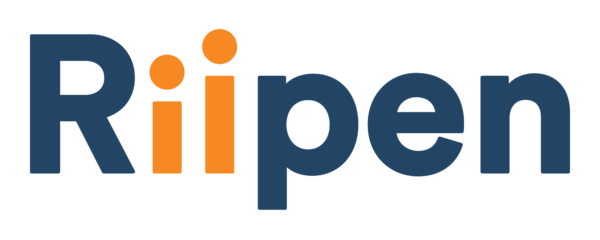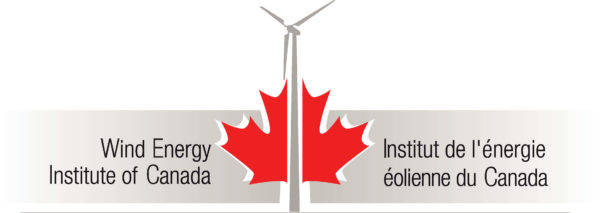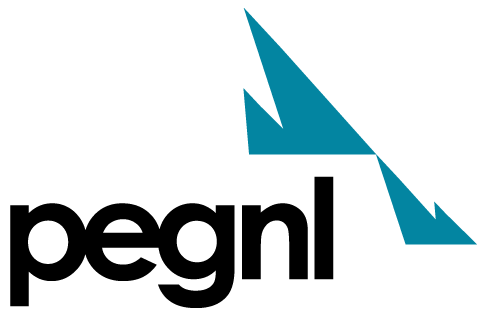Overview
THEME & GENERAL INFO
The Annual Conference of the Canadian Engineering Education Association will be virtual this year and hosted by the Faculty of Sustainable Design Engineering at the University of Prince Edward Island on June 21-23, 2021 with the theme of “Stimulating a Sustainability Mindset in Engineering Education”.
This encompassing theme incorporates key elements of what sustainability means in engineering education, to engineers, and to the future of the Engineering profession: sustainable design, sustainable society via diversity, community, empathy, and accessibility, sustainable earth via stewardship of resources, sustainable work via the interdisciplinary integration of traditional engineering disciplines and between the social sciences, sustainable approach of professionalism, reflection, equity, inclusion, and effective communication. When we come together as a group of Canadian engineering educators in beautiful PEI, we look forward to the conversations and discussions on what sustainability means in engineering and what a sustainability mindset in engineering education means for the future.
Important Dates:
-
- Abstract submissions open: October 12, 2020
- Extended abstracts for all types of presentations deadline: December 11, 2020 January 11, 2021 (reviews starting December 18, 2020)
- Notification of acceptance of abstracts: February 1, 2021
- Workshop proposals due: February 5, 2021
- Full paper submission for peer review deadline: March 1, 2021 March 8, 2021
- Feedback provided to authors of full papers: March 26, 2021 April 19, 2021
- Registration opens: April 2, 2021
- Submission of final, camera-ready papers: April 5, 2020 May 5, 2021
- Early-Bird Deadline: May 7, 2021
- Registration Deadline: June 4, 2021
- CEEA-ACEG Workshop Day: June 20
- Conference Dates: June 20-23
- IEER/IET Workshops: June 18 and June 25
Live program link: https://eventpilotadmin.
All registrants will have received their access codes and links to the conferene from the email CEEA ACEG 2021 <[email protected]. If you have not recieved your code or links please contact your IT department to allow that email past quarantine or spam folders.
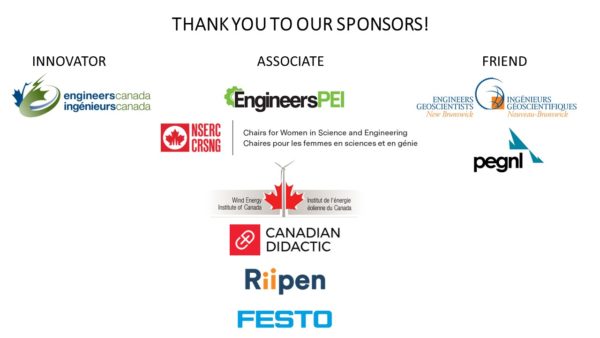
Registration
Registration is now closed.
All registrants will have received their access codes and links to the conferene from the email CEEA ACEG 2021 <[email protected]. If you have not recieved your code or links please contact your IT department to allow that email past quarantine or spam folders.
Important:
-MEMBERS, remember to sign in to access registration discounts!
-Registration deadlines:
- Early-Bird Deadline: April 30, 2021
- Registration Deadline: June 4, 2021
View or download the CEEA ACEG 2021 Workshop descriptions and times:
– CEEA ACEG Workshops Schedule
– Institutes Workshop information and schedule
Please contact [email protected] if you need to make changes to your conference registration (including adding or changing workshops) by June 4. After June 4, please contact the chair of the organizing committee, [email protected].
All sessions will be virtual on the Event Pilot platform. Registrants will be sent links in their event reminder emails.
|
2021 CEEA-ACEG ANNUAL CONFERENCE REGISTRATION FEES |
|
|
EARLY BIRD REGISTRATION FOR CEEA-ACEG MEMBERS (BEFORE APRIL 30, 2021) |
|
|
Student/postdoc with CEEA-ACEG membership |
$100.00 |
|
For current CEEA-ACEG professional members |
$300.00 |
|
REGULAR REGISTRATION FOR CEEA-ACEG MEMBERS (AFTER APRIL 30, 2021) |
|
|
Student/postdoc with CEEA-ACEG membership |
$125.00 |
|
For current CEEA-ACEG professional members |
$375.00 |
|
REGISTRATION FOR NON-CEEA-ACEG MEMBERS |
|
|
Student/postdoc, non-member |
$175.00 |
|
Professional, non-member |
$495.00 |
|
WORKSHOP REGISTRATION |
|
|
Current CEEA-ACEG members & Student Members |
$60.00 & $40.00 respectively |
|
Non-CEEA-ACEG members |
$200.00 |
|
Institute for Engineering Teaching (IET) or Institute for Engineering Education Research (IEER) Workshops |
|
|
Current CEEA-ACEG members (professional and student) |
$100 & $40.00 respectively |
|
Non CEEA-ACEG members |
$200 |
|
ANNUAL MEMBERSHIP FEES |
|
|
Undergraduate, Graduate or Postdoctoral Student |
$25 |
|
Professional |
$100 |
Venue
- The conference dates and session types will be staying the same, only moved to an online platform.
- We have decided to extend the abstract deadline again until January 11, 2021. However, we will begin the review process December 18 for any abstracts that have been submitted. This way, we can guarantee timely feedback to authors. If you have submitted an abstract, there is a strong chance you will be contacted to aid in this process.
- The registration fees will be updated relative to previous years to reflect the online nature of the conference. These will be shared on the conference website in the coming weeks.
- Members get access to discounted registrations so remember to sign in to your account, with an active membership to view the options!
Papers
We invite papers written in English or French on a variety of topics in engineering education. Attendees will have an opportunity to showcase, learn about, and discuss engineering education through a variety of session types. Participants will be asked to classify their work into one of two streams: teaching practice or educational research. Both streams cover works that relate to teaching, learning, assessment, accreditation, student support, professional development, and other aspects of engineering education. The differences in the streams are as follows:
- Engineering Education Practice (“Practice”): includes accounts of innovations, experiences, and evidence-based practices in engineering education.
- Engineering Education Research (“Research”): includes reports of investigations, meta-analyses, and data-informed development of new methods, tools, and frameworks.
There will be four different session types:
- Full-Paper Podium Talks: These are 15 min. (+ 5 minutes Q&A) that aim to present completed work. Papers will be organized into thematic sessions, with typically 4-5 papers presented per session. Full-paper sessions will be 90-minutes in length.
- Lightning Talks: These sessions include 4-6 brief (6 minutes + nominally 4 minutes Q&A) “lightning talk”-style presentations grouped around a common theme, followed by a longer discussion period that is moderated by the session chair. This format will be used to organize evidence-based or data informed work in either the “Practice” or “Research” streams. Lightning Talk sessions will be 75-minutes in length.
- Panel discussion: Panel discussions are designed to facilitate dialogue between panellists from different institutions, different sectors (for example industry and academia) and audience members. The extended abstract for a potential panel discussion should include the names of at least three panellists, a proposed moderator, and an abstract that describes the focus of the panel. Each participant will have an opportunity to speak on the topic via a short presentation, and a longer discussion between all panellists and the audience will follow. Panel discussions will be 75-minutes and submissions related to the conference theme are highly encouraged.
- Special Sessions: Researchers and educators with an interest in a particular topic are invited to propose special sessions. These sessions can be allocated as either a 75-minute session (for extended abstracts) or 90-minute session (when for full papers). An extended abstract for the special session should be submitted that includes the presenter names and contact information, the proposed title of the special session and/or topical focus, intended audience, and the titles of the extended abstracts or full papers from each of the presenters. Special sessions can be for Special Interest Groups (SIGs) and are different from lightning talks (which will be grouped by the technical chair of the conference committee) or panel discussions (which do not require extended abstracts or full papers submissions from each panelist). Note: Each presenter for a Special Session must also submit their own extended abstract or full paper.
While all submissions related to engineering education are welcome, we encourage those focusing on pedagogies, approaches and practice relating to:
- Interdisciplinary and Transdisciplinary engineering education
- Developing and assessing student attitudes and behaviours towards sustainability
- Developing technical foundations for sustainability
- Introducing students to sustainability issues
- Sustainable Engineering within and across engineering domains
- Inclusion, Equity and Diversity in Engineering Education
- Accessibility in Engineering Education
- Engineering Justice & Ethics
- Critical evaluation of sustainability issues in engineering
- Design for Sustainability
- Community & Stakeholder engagement and collaboration
- Accountability and responsibility in the engineering profession
- Responsible Engineering
- Sustainable creativity and innovation
- Empathy in engineering
In light of the rapid transition to online education, we are also planning a special stream on online engineering education. For this stream, we encourage submissions related to:
- New methods and approaches for online education
- Case studies for transitioning and sustaining online education
- Accessibility in online education
- Virtual learning environments
- Online laboratories and experiential education
- Assessments in online education
Extended Abstract Submission
All authors, regardless of the stream or requested presentation type, are invited to submit an extended abstract (500 words maximum) via EasyChair (by January 11, 2021) All abstracts will be reviewed and evaluated based on how they address the following elements, as appropriate:
- Motivation for the work, with reference to relevant literature
- Clear conceptual/theoretical framework
- Comprehensible description of method and methodologies
- Results/conclusions of interest to the membership
When authors submit an abstract, they will be asked to indicate their areas of interest and expertise in engineering education for the purpose of abstract and paper review. Abstracts/papers will be assigned based on these areas of interest and expertise. They will also be asked to indicate whether they intend to participate in the full paper review process, whether their abstract is practice or research oriented, and their preferred presentation format.
It is expected that all authors collecting data from human subjects have approval from a university-based ethics review board for their research.
All authors will receive an indication of whether their abstract is accepted for the conference by February 1, 2021, and for those submitting full-papers, feedback on their abstract that can be used in writing the paper.
Peer-Reviewed Paper Submission
Authors opting to submit a 4-8 page paper for peer review will be required to do so by March 1, 2021. Papers will be reviewed, based on the criteria listed above, and authors will receive feedback on March 16, 2021, with an indication that the paper is accepted as-is, or that revisions are required. Where revisions are required, authors will be asked to submit a revised paper by April 6, 2021.
Authors who are not requested to complete revisions after submitting the paper for peer review will have their papers marked as “peer reviewed” in the conference proceedings and present in a Full Paper Session. Authors who attend to the requested revisions and submit will also have their papers marked as “peer reviewed” in the conference proceedings and present in a Full Paper Session. Authors who decide not to submit a revised full paper will still be invited to present their work in a lightning talk or panel session.
All papers will be made available during the conference and will be published in the CEEA-ACEG proceedings after the conference.
Author Guidelines for CEEA Proceedings Manuscripts
Download English version: CEEA-ACEG AuthorGuide 2021 EN
Download French version: ACEG-CEEA GuideDesAuteurs 2021
Call for Workshops
We invite proposals for workshops covering relevant aspects of teaching and learning in engineering. Workshops on practices that positively impact the engineering teaching environment and students’ abilities, resourcefulness, persistence, and success are particularly sought. Topics of interest include:
- Engineering education research methods;
- Implementation of sustainability mindset in engineering education
- Best-in-class engineering education practices or teaching tools;
- Best online/remote engineering education practices amid COVID-19
- Implementation of educational technologies;
- Integrating and building open engineering educational resources
- Best practices in professional development for engineers;
- Administration of critical thinking and developing active learning experiences
- Professional development needs identified by practicing engineers and employers;
- Initiatives that support diversity, equity and inclusion in engineering;
- Support of student mental, emotional, and motivational wellness and resilience;
- Initiatives for co-curricular student development;
- Initiatives for engineering curriculum development related to remote education
- Continual improvement based on CEAB graduate attributes analysis.
Workshops last 90 minutes and should provide the participants with an interactive experience. Proposals for workshops spanning two or more 90-minute periods will be considered. All regular workshops will be scheduled for Sunday, June 20, 2021. Workshop proposals can be submitted using EasyChair by Friday, February 5, 2021. Workshop proposals should be no more than 500 words and will be considered based on clarity, level of detail, interactivity and relevance to engineering education.
To reach EasyChair, click the words or this link: https://easychair.org/account/signin
Schedule
Live program link: https://eventpilotadmin.
All registrants will have received their access codes and links to the conferene from the email CEEA ACEG 2021 <[email protected]. If you have not recieved your code or links please contact your IT department to allow that email past quarantine or spam folders.
Conference information and session details will be sent shortly to registered conference participants. Please note all times are in ADT (Atlantic). Downloadable document available below.
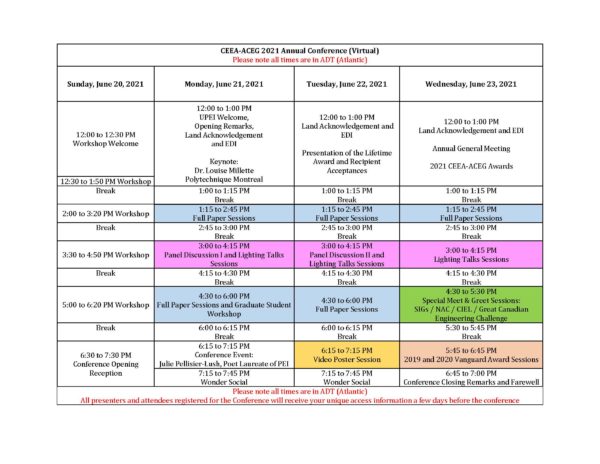
Here are your workshop schedules:
Speakers
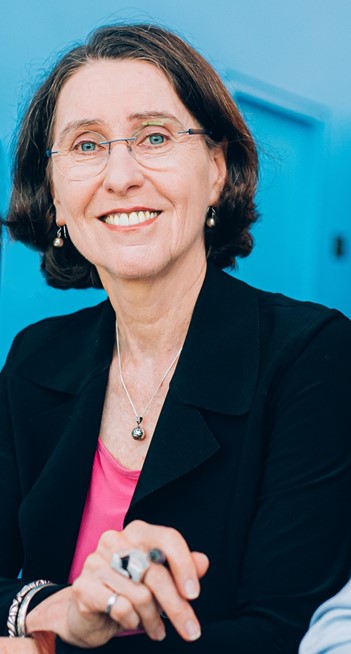
Louise Millette, ing., FIC, Ph.D.
Polytechnique Montreal
Monday, June 21 Keynote Speaker: 12:00 PM (Atlantic)
Louise Millette has been associate professor at Polytechnique Montréal since 2002 and director of the Civil, Geological and Mining Engineering Department until June 1st, 2021. A civil engineering graduate from Polytechnique, she obtained a Ph.D. in Environmental Engineering from Polytechnique after a master’s degree from UBC. She joined the ranks of Polytechnique after having worked for 12 years at Bell Canada, ending her career as deputy divisional chief-environment.
While supporting major academic programs consolidation and managing the ten-fold increase in the number of students enrolled in the department, Ms. Millette has supported Polytechnique’s commitment to sustainability. In 2004, she proposed its first environmental policy and later created the Office of Sustainable Development, whose action plan led to the obtaining of STARS Gold accreditation in 2019.
She has worked at integrating sustainable development principles into the training of engineers in many ways, for example, through the creation of the sustainable development capstone projet (ING8971), the thematic orientation in sustainable development and several MOOCs, including SDES101 Engineers Canada – Sustainability in practice. Ms. Millette is involved in many committees, including the CIRODD Direction Committee and the IET Board of Directors. A long-time partner of the University of Montreal, she sits on two working groups of the initiative Construire l’avenir durablement. Her involvement has earned her several distinctions, including the title of Fellow of Engineers Canada, the prize of the Ministre de l’Éducation et de l’Enseignement supérieur du Québec in the category « Ouvrages multimedia » and the 2019 Prize of the Réseau des femmes d’affaires du Québec in the catégory « Organisme public ou parapublic ».
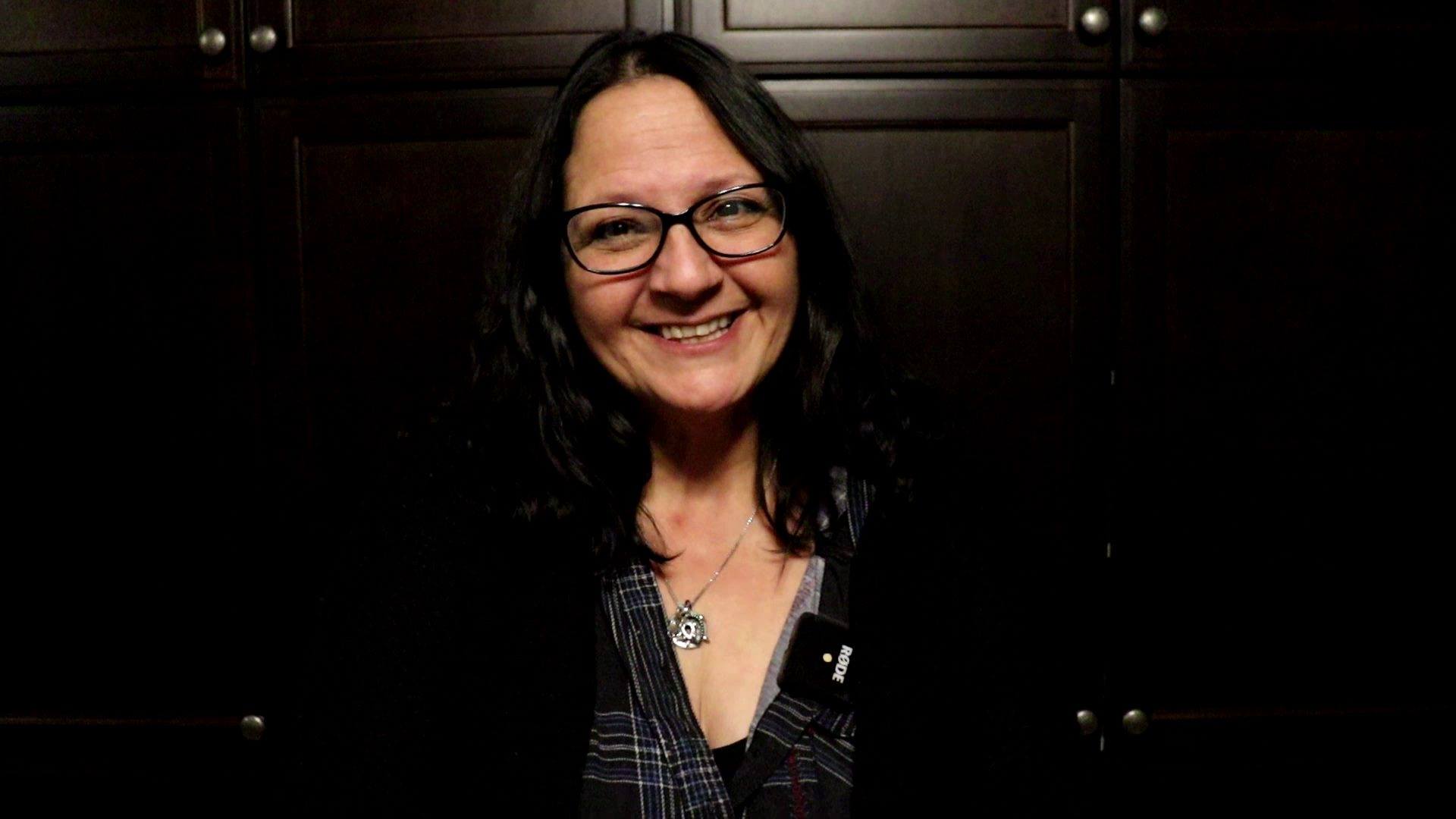
Julie Pellissier-Lush, M.S.M.
Poet Laureate of Prince Edward Island
Monday, June 21 Conference Special Event: 6:15 PM (Atlantic)
Julie Pellissier-Lush M.S.M. , Meritorious Service Medal recipient, actress, and bestselling author of ‘My Mi’kmaq Mother’, was born in Summerside, PEI in 1970. She grew up all over Eastern Canada and spent a number of years in Winnipeg Manitoba before coming home. Julie is a graduated from the University of Winnipeg in 2000 with a double major in Psychology and Human Resource Management. She works with the Mi’kmaq Confederacy of PEI as a Community Consultant Coordinator. She writes, acts, and does photography to preserve the history and culture of the Mi’kmaq for future generations. Julie wrote the poems for the play ‘Mi’kmaq Legends’ in 2010 and it is her hope that this play will someday travel all over Canada and beyond so more people have the opportunity to learn about the rich Mi’kmaq history! In February 2019 Julie became the first Mi’kmaq Poet Laureate of PEI and she is loving every minute of sharing her culture and stories with many groups and events all over the Island. She lives in Winsloe, just outside of Charlottetown with her husband Rick, her five children, and her Granddaughter Miah.
Sponsors

Interested in sponsoring the conference? Check out the available options here: Sponsorship Info 2021
Partner $20,000
Partners receive:
- Three (3) complimentary conference registrations
- Acknowledgement at large-group sessions
- Company logo, contact information, and profile on conference online platform/app
- Up to five (5) URL links on conference online platform/app
- Inclusion in scavenger hunt event on conference online platform/app
- Full-page advertisement in technical program
- Special conference session presentation
- Advertisement on conference online platform/app home screen and session details view
- Splash screen at conference online platform/app startup
- Exclusive sponsor layout tab on conference online platform/ app
- One-year affiliate membership with logo presence on CEEA ACEG website and two (2) professional memberships
Innovator $10,000
Innovators receive:
- Two (2) complimentary conference registrations
- Acknowledgement at large-group sessions
- Company logo, contact information, and profile on conference online platform/app
- Up to five (5) URL links on conference online platform/app
- Inclusion in scavenger hunt event on conference online platform/app
- Half-page advertisement in technical program
- Special conference session presentation
- Advertisement on conference online platform/app home screen and session details view
Collaborator $5,000
Collaborators receive:
- One (1) complimentary conference registration
- Acknowledgement at large-group sessions
- Company logo, contact information, and profile on conference online platform/app
- Up to five (5) URL links on conference online platform/app
- Inclusion in scavenger hunt event on conference online platform/app
- Quarter page advertisement in technical program
Associate $2,000
Associate Benefits:
- Acknowledgement at large-group sessions
- Company logo, contact information, and profile on conference online platform/app
- Up to five (5) URL links on conference online platform/app
- Inclusion in scavenger hunt event on conference online platform/app
- Business-card sized advertisement in technical program
- One-year affiliate membership with logo presence on CEEA ACEG website and two (2) professional memberships
Committee
Conference Chair: Dr. Amy Hsiao ([email protected])
Technical Chair: Dr. Grant McSorley ([email protected])
Workshops Chair: Dr. Armin Bodaghkhani
Sponsorship Chair: Dr. Nicholas Krouglicof
Communications, Marketing, and Logistics Chair: Dr. Ali Ahmadi
Student Programs Chair: Mr. Austin Murnaghan
Digital Infrastructure Librarian: Ms. Rosie Le Favre
Administrative Assistant: Ms. Lisa Sanderson






